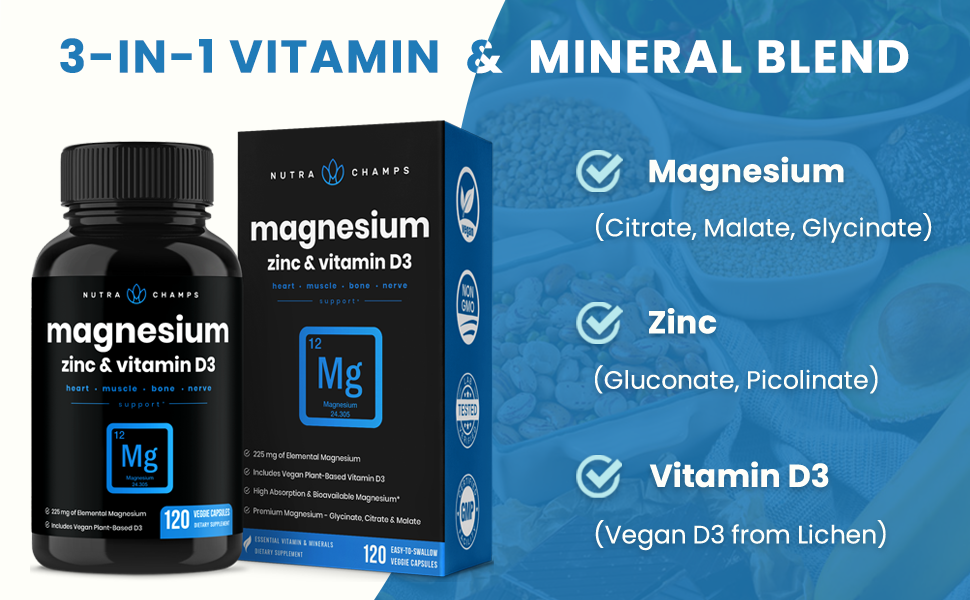In today’s fast-paced world, mental wellbeing has become a crucial aspect of our overall health. While traditional approaches such as therapy and medication are widely recognized, the role of nutrition in mental health is gaining increasing attention. Among various nutrients, zinc and vitamin D3 have emerged as pivotal players in promoting mental wellbeing. This article delves into how these two essential nutrients work together to support mental health, backed by scientific research and real-world examples.
Understanding Zinc and Vitamin D3
Zinc is a trace mineral that plays a vital role in numerous biological processes, including immune function, protein synthesis, and DNA synthesis. It is also essential for brain health and cognitive function. On the other hand, vitamin D3, or cholecalciferol, is a fat-soluble vitamin that is crucial for bone health, immune function, and regulating mood.
The Importance of Zinc in Mental Health

Zinc deficiency has been linked to various mental health disorders. Studies have shown that individuals with lower zinc levels are at a higher risk for depression and anxiety. Some key roles of zinc in mental health include:
- Neurotransmitter Regulation: Zinc is involved in the synthesis and regulation of neurotransmitters such as serotonin and dopamine, which are critical for mood stabilization.
- Antioxidant Activity: Zinc possesses antioxidant properties that help combat oxidative stress, a contributor to neurodegenerative diseases and mood disorders.
- Inflammation Reduction: Zinc helps modulate inflammation in the brain, which has been associated with depression and other mental health issues.
The Role of Vitamin D3 in Mood Regulation
Vitamin D3 is often referred to as the “sunshine vitamin” because it is synthesized in the skin upon exposure to sunlight. Research has increasingly suggested that vitamin D plays a significant role in mental health:
- Serotonin Production: Vitamin D is believed to influence the production of serotonin, a neurotransmitter that contributes to feelings of happiness and wellbeing.
- Protective Effects Against Depression: Several studies have found correlations between low vitamin D levels and increased rates of depression, especially in populations with limited sun exposure.
- Cognitive Function: Adequate vitamin D levels are associated with better cognitive function and a lower risk of cognitive decline in older adults.
The Synergistic Interaction of Zinc and Vitamin D3

While both zinc and vitamin D3 possess individual benefits for mental health, their combined effects can provide even more profound advantages. Understanding this synergy is critical for optimizing mental wellbeing.
Enhanced Neurotransmitter Function
Both zinc and vitamin D3 are involved in neurotransmitter function, with zinc being directly implicated in neurotransmitter synthesis and vitamin D3 influencing serotonin production. This combined action can lead to improved mood regulation and reduced symptoms of anxiety and depression.
Boosting Immune Function and Reducing Inflammation
A healthy immune system is crucial for mental wellbeing. Both zinc and vitamin D3 play significant roles in immune function. By working together to reduce inflammation, they can help mitigate the effects of chronic inflammatory conditions often linked to mood disorders.
Case Studies and Statistics
Numerous studies have explored the relationship between zinc, vitamin D3, and mental health. For instance:
- A study published in the journal Psychiatry Research found that individuals with major depressive disorder had significantly lower levels of zinc compared to healthy controls.
- Research in The Journal of Clinical Endocrinology & Metabolism highlighted that low vitamin D levels were associated with a higher prevalence of depression among elderly individuals.
- A meta-analysis in Nutrition Reviews indicated that supplementation with both zinc and vitamin D3 resulted in improved mood and reduced anxiety levels among participants.
Practical Applications: How to Optimize Zinc and Vitamin D3 Intake

To harness the benefits of zinc and vitamin D3 for mental wellbeing, it is essential to incorporate them into your diet or consider supplementation when necessary. Here are some practical tips:
Dietary Sources of Zinc

Incorporating zinc-rich foods into your diet can help maintain adequate levels:
- Red meat
- Poultry
- Shellfish (especially oysters)
- Legumes (beans, lentils)
- Nuts and seeds (pumpkin seeds, cashews)
Dietary Sources of Vitamin D3

Vitamin D3 can be obtained through diet and sunlight exposure:
- Fatty fish (salmon, mackerel)
- Egg yolks
- Fortified foods (milk, orange juice)
- Sunlight exposure (15-30 minutes several times a week)
Consider Supplementation
If dietary sources are insufficient, supplementation may be necessary. Consult a healthcare provider to determine the appropriate dosage:
- Zinc supplements (typically 15-30 mg daily for adults)
- Vitamin D3 supplements (ranging from 600 to 2000 IU daily, depending on individual needs)
Conclusion: The Path to Enhanced Mental Wellbeing

The interplay between zinc and vitamin D3 underscores the importance of nutrition in supporting mental health. Their combined effects on neurotransmitter function, immune modulation, and inflammation reduction highlight the potential for these nutrients to improve mood and overall mental wellbeing. By prioritizing a diet rich in these essential nutrients and considering supplementation when necessary, individuals can take proactive steps toward enhancing their mental health.
In summary, understanding the synergistic benefits of zinc and vitamin D3 can empower individuals to make informed choices about their nutrition and mental health. As the research continues to evolve, prioritizing these nutrients may serve as a foundational approach to fostering mental wellbeing in an increasingly complex world.




